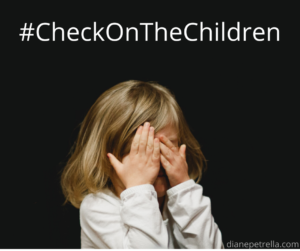Check on the Children During the Covid-19 Pandemic
 Staying home during this pandemic is the right thing to do. But when it started, the first thing I thought was:
Staying home during this pandemic is the right thing to do. But when it started, the first thing I thought was:
What will happen to vulnerable children in abusive homes?
These children aren’t going to day care, school, or after-school programs where astute adults can notice something amiss. The stress in their families, as in all families these days, is heightened. And in emotionally and physically abusive families, children often are the targets of parental stress.
Child sexual abuse isn’t triggered by stress. It’s much more insidious. What perpetuates sexual abuse is that it is a “secret” between the child and offender. Now more than ever, it’s easy to keep things secret when families stay at home and children are isolated.
All of these children are at risk. They’re in greater danger now that staying at home is the norm in most US states. For them, their homes aren’t safe havens with parents giving them fun things to do during school break. Many of these homes resemble prisoner-of-war camps. I wish I were exaggerating but I’m not. I’ve worked with these kids and heard first-hand their truth.
If you have suspected that a child was being abused, now is the time to contact your state child protective agency with your concerns. Or you can call the ChildHelp National Child Abuse Hotline at 1-800-422-4453 (1-800-4-A-Child).
You don’t need “proof” and you can call anonymously. A child protective worker hears your concerns and their team makes the decision as to whether there is enough information to investigate. If there isn’t, your report stays in their system. If they get several calls about that child and family, they then take action. While all state laws are different, that’s generally how it works.
If you have contact information about a child you’re concerned about—perhaps the child of a neighbor, friend, or family member—reach out. Call the parent to check-in about how they’re doing during this difficult time. Your call may help them feel loved. And the love they feel may be extended to their child.
Call the child or teen just to say hello. Or plan a time to video chat. Even if you can’t stop what they may be experiencing, reaching out helps them feel loved and valued. You give them the experience that a trusting adult cares.
Send them gifts in the mail. Perhaps a book, puzzle, or board game. Or, send them a sweater with a note to think of you hugging them when they wear it.
These are hard times for all of us. But they’re harder for children and teens in abusive families. Reach out. Let them know you care. Don’t underestimate the power of a simple, loving gesture.
You just may be the person who makes the biggest difference in their life. ❤️


